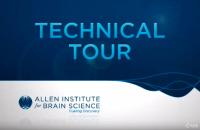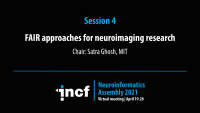Below you will find the latest courses. Please search or select the courses based on the below filters.

How to Use Allen Institute for Brain Science Resources
Allen Institute for Brain ScienceThis course features tutorials on how to use Allen atlases and digital brain atlasing tools, including operational and user features of the Allen Mouse Brain Atlas, as well as the Allen Institute's 3D viewing tool, Brain Explorer®.

Introductory Concepts
Krembil Centre for NeuroinformaticsThis couse is the opening module for the University of Toronto's Krembil Centre for Neuroinformatics' virtual learning series Solving Problems in Mental Health Using Multi-Scale Computational Neuroscience. Lessons in this course introduce participants to the study of brain disorders, starting from elemental units like genes and neurons, eventually building up to whole-brain modelling and global activity patterns.

INCF Assembly 2023 - Lightning Talks (Day 1)
INCFThis course consists of three lessons, each corresponding to a lightning talk given at the first day of INCF's Neuroinformatics Assembly 2023. By following along these brief talks, you will hear about topics such as open source tools for computer vision, tools for the integration of various MRI dataset formats, as well as international data governance.

INCF Assembly 2022 - Day 1 Sessions
INCFSessions from the INCF Neuroinformatics Assembly 2022 day 1.

FAIR Approaches for Neuroimaging Research
INCFOver the last three decades, neuroimaging research has seen large strides in the scale, diversity, and complexity of studies, the open availability of data and methodological resources, the quality of instrumentation and multimodal studies, and the number of researchers and consortia. The awareness of rigor and reproducibility has increased with the advent of funding mandates, and with the work done by national and international brain initiatives.

INCF Assembly 2023 - Lightning Talks (Day 2)
INCFThis course consists of several lightning talks from the second day of INCF's Neuroinformatics Assembly 2023. Covering a wide range of topics, these brief talks provide snapshots of various neuroinformatic efforts such as brain-computer interface standards, dealing with multimodal animal MRI datasets, distributed data management, and several more.

Computational Neuroscience: The Basics
INCFThis course consists of a series of lessons which aim to introduce the basic conceptual and experimental approaches in computational neuroscience.

Current Methods in Neurotechnology
NeurotechEUThe lecture series focuses on current trends in modern techniques in neuroscience. Inspiring scientists from the NeurotechEU Alliance will give an overview of the latest advances and developments.

INCF Short Course: Introduction to Neuroinformatics
INCFThe emergence of data-intensive science creates a demand for neuroscience educators worldwide to deliver better neuroinformatics education and training in order to raise a generation of modern neuroscientists with FAIR capabilities, awareness of the value of standards and best practices, knowledge in dealing with big datasets, and the ability to integrate knowledge over multiple scales and methods.

INCF Assembly 2022 - Day 2 Sessions
INCFSessions from the INCF Neuroinformatics Assembly 2022 day 2.

Neuroimaging Connectomics
Krembil Centre for NeuroinformaticsThis course consists of one lesson and one tutorial, focusing on the neural connectivity measures derived from neuroimaging, specifically from methods like functional magnetic resonance imaging (fMRI) and diffusion-weighted imaging (DWI). Additional tools such as tractography and parcellation are discussed in the context of brain connectivity and mental health. The tutorial leads participants through the computation of brain connectomes from fMRI data.

INCF Short Course: Introduction to Neuroinformatics
INCFThe emergence of data-intensive science creates a demand for neuroscience educators worldwide to deliver better neuroinformatics education and training in order to raise a generation of modern neuroscientists with FAIR capabilities, awareness of the value of standards and best practices, knowledge in dealing with big datasets, and the ability to integrate knowledge over multiple scales and methods.

Simulating Brain Microcircuit Activity and Signals in Mental Health
Krembil Centre for NeuroinformaticsThis course offers lectures on the origin and functional significance of certain electrophysiological signals in the brain, as well as a hands-on tutorial on how to simulate, statistically evaluate, and visualize such signals. Participants will learn the simulation of signals at different spatial scales, including single-cell (neuronal spiking) and global (EEG), and how these may serve as biomarkers in the evaluation of mental health data.

INCF Assembly 2022 - Day 3 Sessions
INCFSessions from the INCF Neuroinformatics Assembly 2022 Day 3.

Session 8: FAIR Data: The Role of Journals
INCFMost neuroscience journals request authors to make their data publicly available in appropriate repositories. The requirements and policies put forward by journals vary, and the services provided for different types of data also differ considerably across repositories.

Notebooks
Notebook systems are proving invaluable to skill acquisition, research documentation, publication, and reproducibility. This series of presentations introduces the most popular platform for computational notebooks, Project Jupyter, as well as other resources like Binder and NeuroLibre.

Using brainlife.io
brainlife.ioThis course provides several visual walkthroughs documenting how to execute various processes in brainlife.io, an open-source, free and secure reproducible neuroscience analysis platform. The platform allows to analyze Magnetic Resonance Imaging (MRI), electroencephalography (EEG) and magnetoencephalography (MEG) data. Data can either be uploaded from local computers or imported from public archives such as OpenNeuro.org.

Module 4: fMRI
Mike X. CohenThis module covers fMRI data, including creating and interpreting flatmaps, exploring variability and average responses, and visual eccenticity. You will learn about processing BOLD signals, trial-averaging, and t-tests. The MATLAB code introduces data animations, multicolor visualizations, and linear indexing.

FAIR neuroscience and EBRAINS tools for data sharing, analysis, and simulation
INCFThis workshop provides an opportunity to explore the advanced tools and techniques for data sharing, analysis, visualization, and simulation.

Deep Learning: Associative Memories
NYU Center for Data ScienceThis module covers the concept of associative memories in deep learning. It is a part of the Deep Learning Course at NYU's Center for Data Science. Prerequisites for this module include: Introduction to Deep Learning (module 1 of the course), Parameter Sharing (module 2 of the course),
